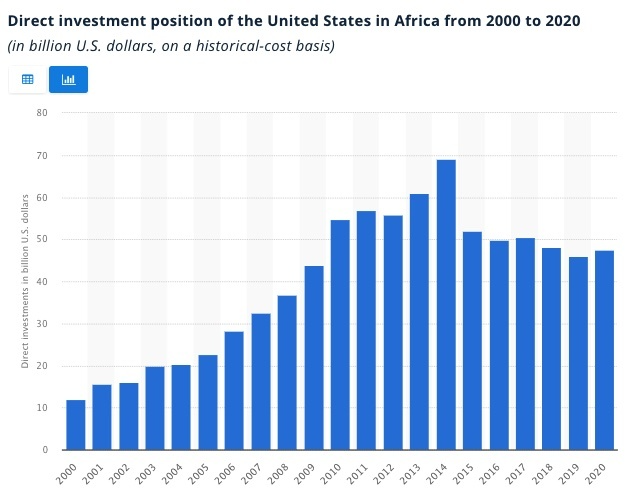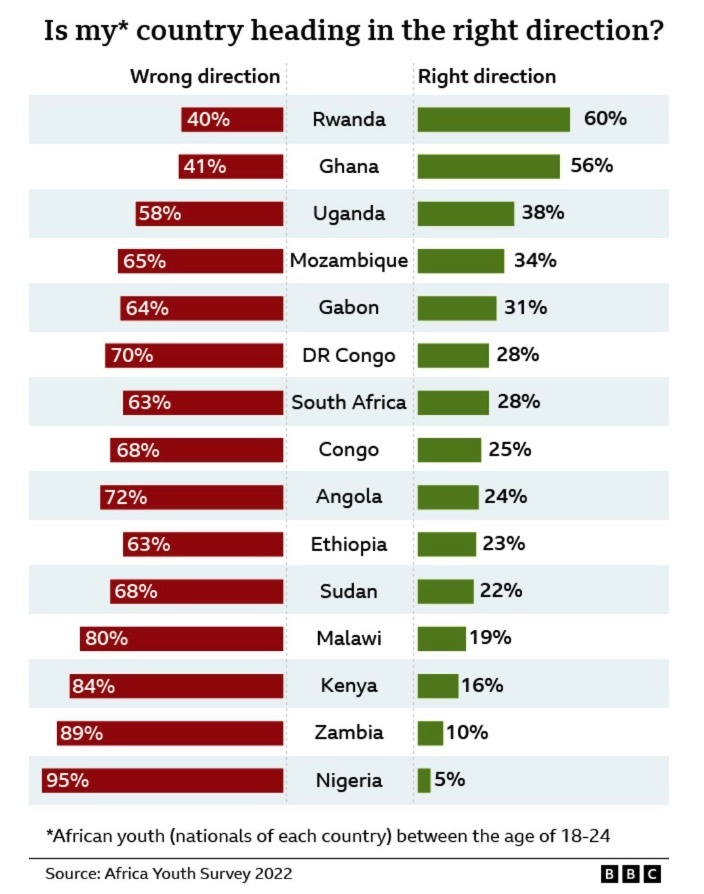Many millions of young Africans want to migrate from their home countries to better jobs, especially in Europe and the United States, says a survey funded by a prominent South African investor.
“A new survey of more than 4,500 young people in Africa, aged 18-24, has found that 52% of them are likely to consider emigrating in the next few years, citing economic hardship and education opportunities as the top reasons,” said a BBC report on the survey, titled the African Youth Survey.
Africa’s fast-growing population includes 360 million people between 15 and 30. That number is larger than the U.S. population of 320 million.
If just half want to emigrate, and just one percent of the half reach the United States, the resulting 1.8 million African arrivals would double the flood of 1.75 million arrivals invited to the southern border in 2021 by President Joe Biden.
But a similar 2019 poll said one-fifth of would-be African migrants — or 45 million people — want to migrate to the United States. Another one in four wants to find jobs in nearby Europe, said the 2019 poll.
Africa also has an additional population of 540 million children aged up to 15, according to PopulationPyramid.net.
The BBC report noted that Western investors could profit — and also reduce the migration pressure — by hiring Africans to sell U.S.-made goods and services throughout the continent:
The world needs to wake up and invest in Africa, so that young Africans do not feel they have to move abroad to achieve their dreams at the expense of their home countries, according to the man behind the survey, Ivor Ichikowitz.
“It’s bigger than a brain drain,” Mr Ichikowitz told the BBC Newsday programme. “This group of people, 18 to 24 year olds in Africa, are saying: ‘We are going to improve our lives, even if it means having to up and leave and go somewhere else.'”
Currently, U.S. companies face little pressure to export products and services to consumers in Africa. One cause for the lack of pressure is that the federal government keeps importing additional consumers from central and south America by failing to enforce the nation’s border laws. In 2021, for example, Biden imported at least 1.5 million extra foreign consumers and workers.
Many migrants die during the government-backed population transfer.
U.S. business groups prefer government policies that invite the mass migration of consumers, renters, and workers into the United States.
The investors’ preferred policy of Extraction Migration was explained in November 2021 by a GOP-tied economist who directs a D.C.-based political group for investors:
Throughout the 1990s, economists expected investors in wealthy countries to move job-creating investments to the developing world and, thereby, raise billions of people out of poverty, Douglas Holtz-Eakin, president of the GOP-linked American Action Forum, said.
However, “for any number of reasons — inability to enforce contracts, political problems — the capital [in wealthy countries] really didn’t flow that way. It stayed in these [wealthy] countries,” he said during an October 26 online talk organized by far-left public publication DemocracyJournal.org.
“But economics does abhor a vacuum, and so now the [poor] labor is coming for the capital,” via international migration, according to Holtz-Eakin, a pro-migration economist who formerly worked for Sen. John McCain and for President George W. Bush when he was pushing the open-borders “any willing worker” claim.
U.S. direct investment in Africa climbed steadily from around $11 billion in 2000 up to $69 billion in 2014, according to Statista.com. But it has since plummeted to just $47.5 billion in 2020.
In April 2021, Business Insider reported:
Across the continent, an estimated 18% of shipped smartphones were made by [China’s] Tecno Mobile, and 15% by Samsung. Competitor Chinese brand Huawei came in fourth, at 8% – after Tecno’s sister [China] brand Itel, at 12%.
Tecno and Itel are both owned by Transsion Holdings. Add in the numbers for a third brand in the stable, Infinix, and the holding company sold nearly half of all new smartphones on the continent in 2020.
China’s government-directed companies have spent twice as much trying to win African consumers as the U.S. companies spent from 2014 to 2018, according to Statista.
The U.S. policy of welcoming many legal and illegal migrants hurts the economic and political development of the sending countries, said Mark Krikorian, director of the Center for Immigration Studies:
These aren’t even just random young people [ouf of Africa]. These are the more educated urban young people, the future of those societies. This is the kind of this is the most damaging kind of brain drain … [because] this is a broad swath of their future leadership. In the long run, that is a disaster for societies. [In the short run] it takes away the pressure for social and economic and political change … A handful of people moving abroad and taking jobs might be useful for a developing country. But when large swaths of their future leadership leave — or even if they want to leave — that is in the long run is terribly harmful for those countries,
That damage-by-immigration process is displayed in Mexico and the Central American countries, where emigration to the United States has reduced domestic pressure for political and economic development, he said. “The advocates for mass immigration don’t really think about it because they believe in their own press releases,” he said, adding “I don’t think that there’s some kind of design on their part to harm these countries — they’re [just] deluded.”
Some left-wing activists recognize the colonialism-like nature of Washington D.C.’s Extraction Migration economic policy. For example, Jean Guerrero, a columnist at the Los Angeles Times, wrote on June 9, 2022:
Much of the riches apparent in the United States come from the theft of not only Latin America’s crops and minerals but also its people, trafficked here to harvest crops and clean homes for dismal wages.
Other surveys and polls show similarly high support for migration among young people in developing regions.
In 2018, Afrobarometer, an African polling firm, reported:
About half of two groups that are critical to African countries’ economic future – the young and the highly educated – have considered emigrating in search of greener pastures, according to a new Afrobarometer video based on data from nine countries.
…
Almost half (45%) of 18- to 25-year-olds and fully half (50%) of respondents with postsecondary qualifications have considered emigrating (Figure 2). The proportions are particularly large among Zimbabweans, Ghanaians, and Malawians.
Many international migrants are poor by Western standards but are prosperous enough to fund their migration with loans from family members. Many other would-be migrants — including young migrants — get the money by indebting themselves to labor traffickers, who subsequently put them into black-market jobs throughout the United States.
When migration is tolerated by Western governments, then the first wave of successful migrants can work with smugglers and home-country banks to fund the next wave of migrants. For example, many Central Americans fund their migration by first mortgaging their homes and farms to local banks. Many take that risk because their friends and relatives in the United States guide them by cellphones on how to get through the “catch and release” and the “Unaccompanied Alien Children” gateways at the U.S. border, and then help them get jobs and housing.
Extraction Migration
Since at least 1990, the D.C. establishment has extracted tens of millions of migrants and visa workers from poor countries to serve as legal or illegal workers, temporary workers, consumers, and renters for various U.S. investors and CEOs.
This economic strategy of Extraction Migration has no stopping point. It is brutal to ordinary Americans because it cuts their career opportunities, shrinks their salaries and wages, raises their housing costs, and has shoved at least ten million American men out of the labor force.
Extraction migration also distorts the economy and curbs Americans’ productivity, partly because it allows employers to use stoop labor instead of machines. Migration also reduces voters’ political clout, undermines employees’ workplace rights, and widens the regional wealth gaps between the Democrats’ big coastal states and the Republicans’ heartland and southern states.
An economy built on extraction migration also alienates young people and radicalizes Americans’ democratic, equality-promoting civic culture because it allows wealthy elites to ignore despairing Americans at the bottom of society.
The extraction migration economic policy is hidden behind a wide variety of noble-sounding excuses and explanations. For example, progressives claim that the U.S. is a “Nation of Immigrants,” that Americans have a duty to accept foreign refugees, and that the state must renew itself by replacing populations.
But the colonialism-like economic strategy also kills many migrants, exploits poor people, and splits foreign families as it extracts human-resource wealth from the poor home countries. The migration policy also minimizes shareholder pressure on companies to build up complementary trade with poor countries.




COMMENTS
Please let us know if you're having issues with commenting.